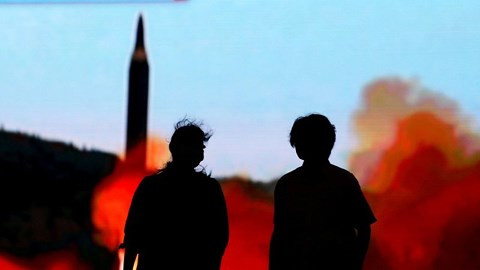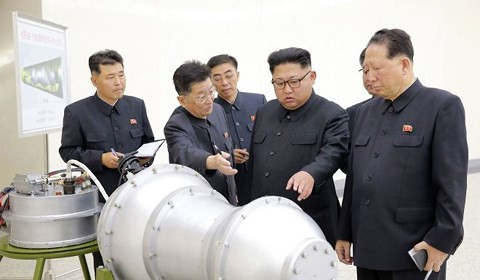Korean Peninsula War Breaks Out in Early 2018?
The continuous and tense developments on the Korean peninsula have led Beijing advisors to predict that war in this region could break out as early as 2018, especially when China and the US have not yet reached a consensus.
2017 witnessed Pyongyang's rapid nuclear and missile development, even beyond experts' predictions and pushing the Korean peninsula into the greatest spiral of tension in decades.
According to the South China Morning Post (SCMP), this is the reason why Beijing advisors predict that war on the Korean peninsula could break out as early as 2018.
 |
| Beijing advisers say war on the Korean peninsula could break out as early as 2018. |
Over the past year, North Korea has conducted 16 missile tests and launched 23 missiles of various types. In September, Pyongyang conducted its sixth nuclear test involving a thermonuclear bomb (H-bomb) with the largest explosive power compared to the previous five tests. North Korea's actions have forced the United Nations (UN) to continuously increase sanctions. Notably, China, North Korea's closest ally, has also voiced support for the sanctions after the US increased pressure on Beijing to take further steps to curb Pyongyang's nuclear and missile ambitions.
The crisis on the Korean peninsula has also complicated US-China relations. In an attempt to increase the effectiveness of sanctions against North Korea, US President Donald Trump on his personal Twitter account has "bombarded" China with accusations of refusing to help Washington restrain Pyongyang.
But the move helped the US secure China’s support for the first round of UN Security Council sanctions on North Korea imposed under the Trump administration, which went into effect in June. The UN sanctions target Chinese companies with financial ties accused of supporting North Korea’s nuclear and missile programs.
In late June, Washington took further aggressive action against US-China relations when it unilaterally imposed sanctions on Chinese individuals, companies, and a bank.
For its part, China has supported the UN sanctions against North Korea. Specifically, China agreed to ban the export of nearly 90% of refined petroleum products to North Korea.
In February, China also cut off coal imports from North Korea, one of its most profitable exports. Imports of North Korean goods into China have also dropped sharply, severely impacting the revenue of traders on the China-North Korea border.
But even as it faces mounting international pressure, Pyongyang has continued to test missiles, including its first successful test of an intercontinental ballistic missile (ICBM) in July and the launch of the Hwangsong-15 ICBM on November 29. According to analysts, the Hwangsong-15 ICBM has a range of up to 13,000 km, which puts the entire US mainland within range of North Korean missiles.
As discussions on military options to stop North Korea’s nuclear ambitions grow, experts predict that tensions could escalate into war before China and the US reach a consensus on a joint plan to address issues related to Pyongyang.
Following the coal import ban in February, China announced in August that it would impose new sanctions on North Korean iron, iron ore, and seafood.
SCMP quoted customs sources as saying that exports of electricity, oil and gas products to North Korea have dropped sharply while food items such as corn and bananas from China to North Korea have increased sharply. In addition, North Korea has increased textile exports to China as Beijing's coal import ban has pushed Pyongyang's economy into a tailspin.
North Korean businesses in China, such as restaurants, have also been ordered to close. North Korean workers in China are also expected to be sent home next month after the Chinese government ordered all North Korean businesses to close within 120 days from September 11. This is also the day the Security Council announced a new set of sanctions against Pyongyang after North Korea's repeated ballistic missile and nuclear tests.
 |
| Under pressure from the international community, North Korea continues to test nuclear weapons and missiles. |
Amid the escalating instability on the Korean Peninsula, Beijing has repeatedly stated that it will not allow war or chaos in the region. This is also the reason why Chinese scholars and officials believe that Beijing needs to have a plan to deal with the worst-case scenario. For its part, affirming that the military strike plan is still on the table, the US military is currently increasing communication with its Chinese counterpart to control the situation and avoid unfortunate conflicts.
However, many analysts believe that the UN sanctions will only "furiate" North Korea and make it more determined to move towards possessing nuclear weapons.
In addition to agreeing with the international community to increase sanctions on North Korea, the Chinese military has also conducted many exercises in the East China Sea and the Yellow Sea, areas near the Korean Peninsula. According to analysts, China's military exercises are a "warning" to both North Korea and the United States.
Chinese analysts also admit that Beijing has lost control of its neighbor and once-close ally, North Korea. This is why on December 6, the Jilin Daily published a full page on how to respond to a nuclear attack. Chinese scientists also warned that the Punggye-ri nuclear test site, located right next to the China-North Korea border, could collapse, causing radioactive fallout to spread to Jilin Province.
According to Infonet

